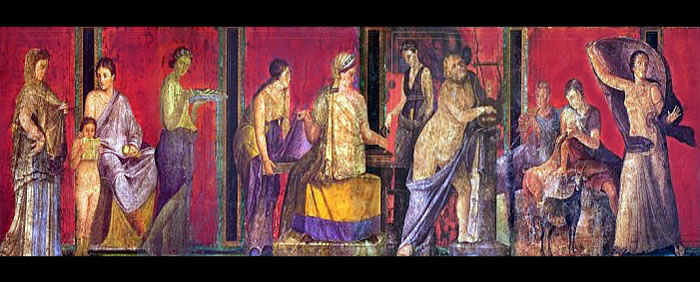The luxury and the Lex Oppia

The only reality in which the Romans considered lawful the female action was limited to the domus, but also in this space women were not supposed to get involved in politics; according to the mos maiorum the woman should be a wife and mother and was treated as an asset that the pater familias controlled and passed, by marriage, from father to husband and became part of his familia to whom also went her possessions.
Women could not participate in politics, just as mothers and wives had the opportunity to "influence" the men but at the beginning of the second century BC a group of nobles and rich matrons protested against a Senate decision which they judged unnecessarily oppressive.
The tribunes Marcus Fundanius and Lucius Valerius proposed in 195 BC the repeal of the lex Oppia adopted in 215 BC on the eve of the Second Punic War, when the Treasury coffers had been emptied and it was decided to impose a tax to the female assets from a limitation in the ostentation of opulence appearance; in the most obvious consequences of the law it limited the amount of gold that women could own, established the type of clothing and means of transport they could have; essentially imposed a high rate of tax to the assets of Roman matrons.
After the defeat of Cannae, and with the fear of the Carthaginians at the gates of Rome, the Roman matrons had willingly given their gold to defend the state, but after the defeat of Carthage the Treasury funds were again filled. The wars of conquest had brought great riches to the patrician families and these indulged in the ostentation especially to differentiate themselves from new rich families who moved to Rome from the provinces, but certainly there was also the aesthetic pleasure of appearing.
Pliny, in his Naturalis Historia, complains of some great conquests like that of Scipio Asiaticus and Manlius who had sparked the race to possess valuable clothes, silver embossed and the bronze tricliniar beds of the Hellenistic courts.
True opponent of this craze for luxury was Cato who in 195 had just the position of censor and therefore he opposed the repeal of the Lex Oppia; but Cato's opponents were not only the tribunes how much matrons which eventually in the early second century. B.C. owned most of the wealth of Rome.
This situation was being formed in time because if it is true that in the patrician families was always a man who held the manus, it could happen that when the pater familias, or at least the person who held the manus, died entrust his wife and / or daughter to a guardian but, in his will, he could give to the matron the tutoris opto, that is the right to choose their guardian, with the result that women could change their guardian until they found who respected and would hear their desires and wishes. It happened often that the matrons remain widows for both the custom to unions in which the man was much older, for the short duration of life expectancy and the probability of death of men at war and therefore the great fortunes were very often controlled just by women .
When the two tribunes proposed the repeal of the lex Oppia of Cato's voice rose high and contrary but the proposed repeal was greeted with jubilation by wealthy patrician women who were free to dispose of their assets but when Cato led the Senate to reject the proposal, as reported by Valerio Massimo, it unleashed an ordo matronarum that descended into the Forum, and laid siege to the Senate ...
Sign up and read the rest of the article!
by M.L. ©ALL RIGHTS RESERVED (Ed 1.0 - 30/10/2016)






